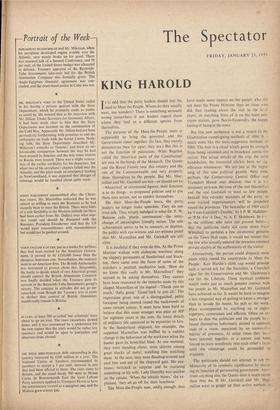—Portrait of the Week— PARLIAMENT REASSEMBLED and Mr. Mikoyan, when
his aeroplane developed engine trouble over the Atlantic, very nearly broke up for good. There was renewed talk of a Summit Conference, and 59 per cent. of the United States budget was allocated to defence. Treasury approval of the Reynolds- Tube Investments take-over bid for the British Aluminium Company was formally given. The Anglo-Egyptian financial agreement was con- cluded, and the drum-head justice in Cuba was not.
MR. MIKOYANPS VISIT to the United States ended in his having a private quarrel with the State Department, which he promptly made as public as could be. He insisted that at his interview with Mr. Dillon, Under-Secretary for Economic Affairs, it had been made clear to him that the State Department was insistent on the continuation of the Cold War. Apparently Mr. DiIldn had hot been particularly forthcoming with promises to end the embargoes on trade with the Soviet Union. Noth- ing loth,- the State Department described Mr. Mikoyan's remarks as 'fatuous, and drew an un- favourable comparison between the way he had been treated in America and the way some visitors to Russia were treated. There was a slight restora- tion of the earlier cordiality for his departure, but when two of his aeroplane's engines failed over the Atlantic, and the pilot made an emergency landing in Newfoundland, it was expected that charges of sabotage would be bandied about quite soon.
*
WHEN PARLIAMENT reassembled after the Christ- mas recess, Mr. Macmillan indicated that he was almost as willing to meet the Russians as he had recently been to meet the British. There were hints of a new flexibility in the Western attitude (as there had been earlier from Mr. Dulles) over what mat- ters could and should be discussed with the Russians. President Eisenhower said that the US would meet reasonableness with reasonableness but would not be pushed around.
*
WHEN ENGLISH ELECTRIC put in a tender for turbines that had been invited by the American Govern- ment, it proved to be £110,000 lower than the cheapest American one. Nevertheless, the contract went to an American firm. The British Ambassador was instructed to protest about this. Meanwhile, the battle to decide which of two American groups should control the British Aluminium Company was finally decided when the Treasury gave its consent to the Reynolds-Tube Investments group's victory. The contrast in attitudes did not go un- remarked, even though the Treasury was at pains to declare that control of British Aluminium would really remain in Britain.
IN CUBA, at least 500 so-called 'war criminals' were about to go on trial. The mass executions slowed down, and it was announced by a spokesman for the new regime that the trials would be rather less summary and would be open to journalists and o.bservers from abroad.
IHE TOTAL HIRE-PURCHASE debt outstanding in this country increased by £100 million in a year. The Natiorial Union of Teachers recommended its members to accept a 5 per cent. increase in pay that had been offered to them. The rains came to Britain, and the usual hardy 500 went to Monte Carlo. In Bournemouth East the local Labour Party secretary applied to Transport House to have the constituency treated as a marginal one, and the Maltese grew crosser yet.










































 Previous page
Previous page